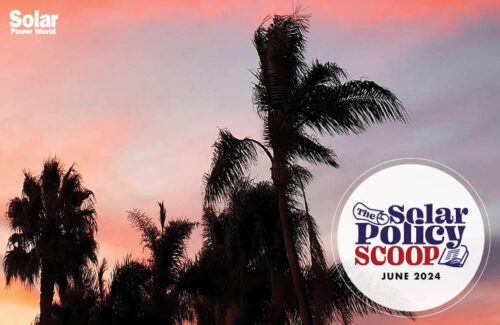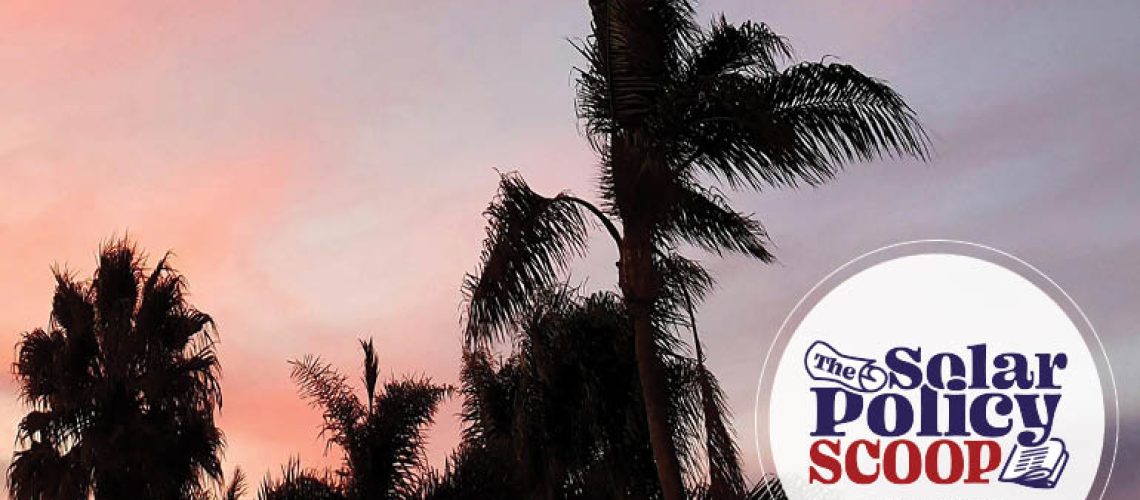
California’s Public Utilities Commission struck another blow to the industry in its new community solar decision.
Bifacial solar panels lose tariff exemption after Biden reverses course
Washington, D.C.
The Biden Administration placed imported bifacial solar panels back under Sec. 201 tariffs after the specialty solar panels enjoyed a two-year exemption from extra duties first initiated by President Joe Biden in 2022. The exemption caused more bifacial modules to be imported into the United States than monofacial panels, undermining the objectives of the original safeguard measure.
Revised 301 tariffs hone in on Chinese solar products, with some exceptions
Washington, D.C.
On May 14, U.S. Trade Rep. Katherine Tai announced further action on Section 301 tariffs after her statutory four-year review, including a new focus on Chinese solar products. The new tariffs are in response to China increasing exports of solar products, lithium-ion batteries and electric vehicles in recent years.
Treasury opens 2024 applications for low-income bonus credit program
Washington, D.C.
On May 28, the U.S. Dept. of the Treasury and IRS began accepting applications for the 2024 Program Year of the Low-Income Communities Bonus Credit Program under Section 48E. All applications submitted within the first 30 days, by June 27, will be treated as submitted on the same date and at the same time.
Treasury seeks comments on updated ITC and PTC rules
Washington, D.C.
The Dept. of the Treasury and IRS will soon release proposed guidance on the updated production tax credit (PTC) and investment tax credit (ITC). Treasury is now asking for comments on the proposed rules and will consult with interagency experts to evaluate how additional clean energy technologies will be able to qualify for the updated clean electricity credits.
DOE opens 48C manufacturing tax credit portal for Round 2
Washington, D.C.
The Dept. of the Treasury, Internal Revenue Service and Dept. of Energy announced that the DOE Qualified Advanced Energy Project Credit Program Applicant Portal (48C Portal) is now open for any interested applicants to register for a new round of allocations. Interested manufacturers must submit their concept papers by June 21 using the 48C portal.
More details on IRA domestic content bonus revealed today by Treasury, IRS
Washington, D.C.
The Dept. of the Treasury has released long-awaited further guidance concerning the domestic content bonus within the Inflation Reduction Act. The update further clarified project descriptions and created a new elective safe harbor that allows developers to rely on Dept. of Energy-provided default cost percentages to determine eligibility.
California regulators approve new residential electric bill fixed charges
Sacramento, California
The California Public Utilities Commission voted May 9 to approve a controversial $24 monthly fixed charge on residential consumers who get their electricity from PG&E, SCE and SDG&E. In exchange for the fixed charge, the per-kilowatt-hour rate consumers are charged for the electricity they use would get a one-time reduction of 5 to 7¢.
CPUC approves utility-backed community solar decision
Sacramento, California
The California Public Utilities Commission voted 3-1 to approve a revised proposed decision on the state’s community solar program on May 30 that solar advocates warned would keep the state far behind others in community solar growth. The approved decision was supported by California’s major investor-owned utilities.
Vermont legislature passes 100% renewable energy bill
Montpelier, Vermont
On May 7, the Vermont Senate passed a bill that would update Vermont’s Renewable Energy Standard to require 100% renewables by 2035. Gov. Phil Scott later vetoed the bill, but the organization Renewable Energy Vermont believes it will still become law when the legislature reconvenes for its veto override session in June.
Vermont slightly lowers net-metering rate during biennial update
Montpelier, Vermont
The Vermont Public Utility Commission decided to lower the state’s net-metering rate by 2¢ after a biennial review of the program. The new rate will be in effect for new systems applied for on or after August 1, 2024.
Colorado bill to optimize electrical grid for clean energy signed into law
Denver, Colorado
Gov. Jared Polis in May signed comprehensive legislation aimed at modernizing the local electric grid, ensuring proactive investments and fostering the adoption of clean energy technologies. The new laws encourage utilities to make long-term infrastructure improvements to accommodate more renewable energy and battery storage on the grid.
Colorado governor signs bill to help localities site utility-scale solar projects
Denver, Colorado
Gov. Polis also signed a bill in May that provides resources to local governments to assess, site and permit utility-scale renewable energy projects, while considering community values, including impacts to lands and wildlife. The new law also directs the Colorado Energy Office to develop model regulations for local governments to adopt siting policies that support both renewable energy development and wildlife resources.
Minnesota advances legislation to improve large-scale solar + storage permitting
St. Paul, Minnesota
The Minnesota Energy Infrastructure Permitting Act has been passed by the state legislature and is awaiting Gov. Tim Walz’s signature. The bill would make important changes to reduce redundancies and improve efficiencies to the state’s permitting process for large-scale energy projects like solar and storage.
New Maryland solar grant program offers up to $7,500 for eligible households
Annapolis, Maryland
The Maryland Energy Administration has launched a new program to provide major incentives for income-eligible Maryland households to install solar panels. The Maryland Solar Access program will provide up to $7,500 per eligible household, based on an incentive of $750 per installed kilowatt-hour of DC solar capacity.
Community solar legislation awaits governor’s signature in Alaska
Juneau, Alaska
Community solar-enabling legislation has passed the Alaska State Legislature and now awaits Gov. Mike Dunleavy’s signature to become law. The bipartisan bill would open up clean energy access for the first time to the more than 260,000 Alaskans who live in rental housing and 79,000 who are living below the federal poverty level.



